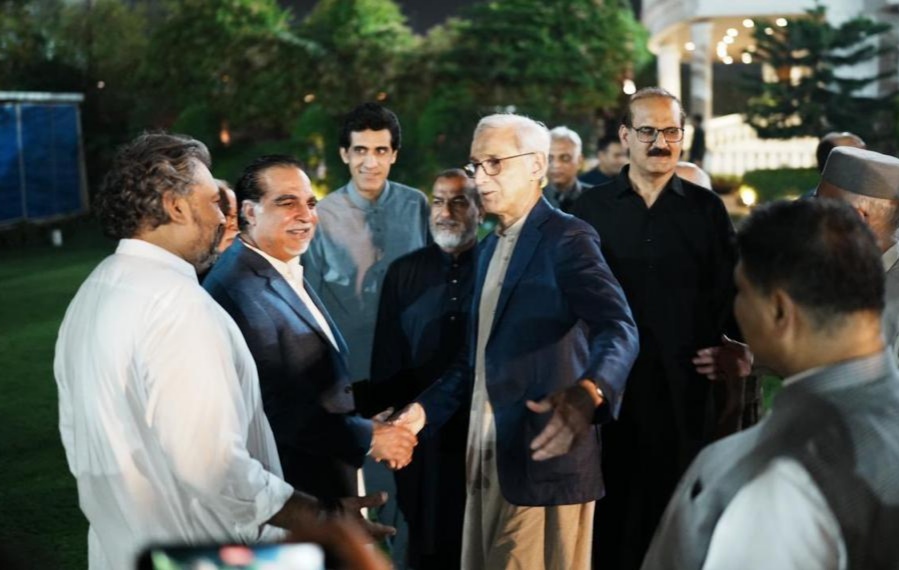From Forward Block to a New Political Party!
By Kamran Baloch
The formation of the forward block within the Pakistan Tehreek-e-Insaf (PTI) occurred after the completion of the first two to three years of the government.
After playing a pivotal role in helping the PTI establish a government in Punjab back in 2018, Tareen, who was once a trusted ally of Imran Khan, found himself at odds with the PTI chief. This disagreement arose when Imran Khan allowed the Federal Investigation Agency (FIA) to apprehend Tareen in early 2021 for his alleged involvement in a sugar scam case.
Subsequently, Tareen’s faction, consisting of 25 Members of the Provincial Assembly (MPAs) including Aleem Khan, played a significant role in the downfall of the PTI-led Punjab government. These lawmakers cast their votes in favor of PML-N’s Hamza Shehbaz during the chief minister election in April of the preceding year.
In 2022, the power corridors and the opposition surprised everyone by tabling a vote of no confidence against Imran Khan in the assembly. Prior to this, several MNAs had already left the PTI, and their departure ultimately contributed to the success of the no-confidence motion.
The age-old game of building up and tearing down political leaders has long been played by the security establishment. However, in a twist of events, the situation didn’t unfold as expected this time, as an unconventional figure defied expectations and refused to step down. Imran Khan, seeking backing from the establishment, found himself empty-handed and consequently opted for his expertise in opposition politics and adopted an aggressive stance against the military establishment, successfully building a narrative that criticized both the military and America. This narrative, in turn, boosted his popularity among the masses.
Until the end of May 2023, it seemed that the power corridors and the government of three to four major parties were unable to impede the ever-increasing charisma of the PTI. Each strategy and maneuver employed by the government to counter the PTI only served to enhance Imran Khan’s popularity. However, on May 9, a significant incident occurred that changed the political landscape.
A plan was devised prior to May 9, when Imran Khan left his Lahore residence at Zaman Park to travel to Islamabad for a court hearing. During his absence, the police entered his house and arrested numerous individuals. It was expected that the government would use this incident to construct a narrative claiming the discovery of terrorists and weapons at Imran Khan’s residence.
However, the incident of May 9 presented an opportunity for the power corridors to play their cards strategically. Several prominent members of the PTI were arrested by the police, only to be released shortly thereafter, where they held a press conference announcing their departure from politics and the PTI, holding Imran Khan responsible for the subsequent riots that erupted nationwide.
This marked a critical turning point, as the power elite played their biggest card by bringing Jahangir Tareen to the forefront, resulting in the formation of the “Istehkam-e-Pakistan Party.” Within days, the politicians who had previously denounced the May 9 incident and claimed to have left politics joined Jahangir Tareen Khan’s new party, aligning themselves with his cause.
This is yet another perplexing mystery surrounding the sudden release and exoneration of the accused individuals who recently joined the new political party. However, the truth behind closed doors is now becoming apparent to the common man. The newly formed party comprises the most influential figures from the Pakistan Tehreek-e-Insaf (PTI) who were once regarded as loyal to the party.
In this current scenario, the script remains unchanged, and the actors involved can be considered method actors who adhere closely to the prescribed storyline, unlike their predecessors who defied expectations. This time, however, they have a vested interest in not betraying the scriptwriter. Each of the political parties, ranging from PPP to PML(n), and from JUI to the newly formed party, recognizes the significance of their personal stakes in Pakistan’s future. As a result, they have become astute in understanding when it is appropriate to gracefully step aside and when it is advantageous to enter the political arena.
Thus, while the cast of characters may shift, the overarching dynamics of Pakistani politics continue to revolve around personal ambition, strategic maneuvering, and an astute understanding of when to make their move. This ensures that the age-old script of political power play remains a constant presence, shaping the destiny of Pakistan’s political landscape.Regardless of the outcome, the tumultuous ride of Pakistani politics is poised to persist, and the only semblance of stability( Istehkam) that can be observed is in the name of the recently launched political party.
Indeed, it seems like a viable plan at first glance. However, there is an important aspect that this plan fails to consider: the potential impact on the economy if an election is not held. Admittedly, even with an election and the formation of a hung parliament, there is not much guarantee of economic stability.
Nonetheless, the uncertainty surrounding the political landscape will only serve to further delay progress on the economic front. Even if individuals believe that the entire system can be sustained, with or without a legal mandate, there is a possibility that this support will wane within a year or so.

— The writer is a student of M.Phil Mass Communication at University of the Punjab

